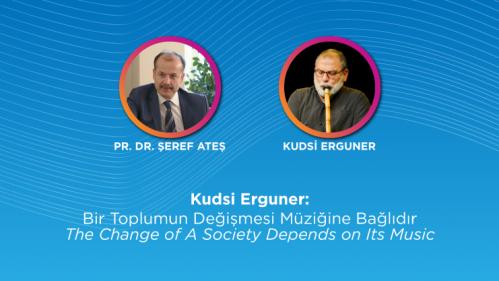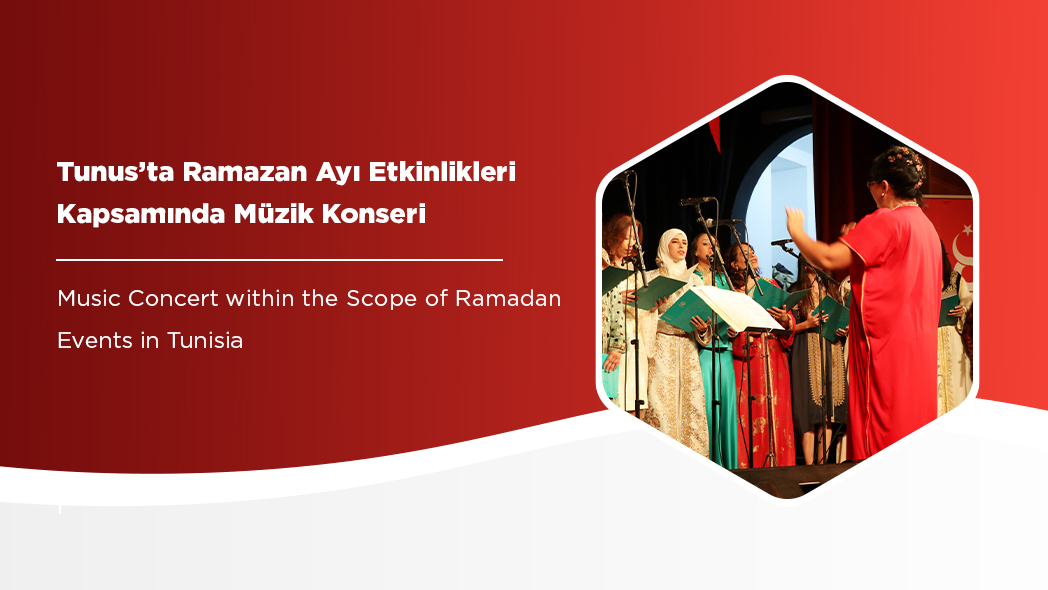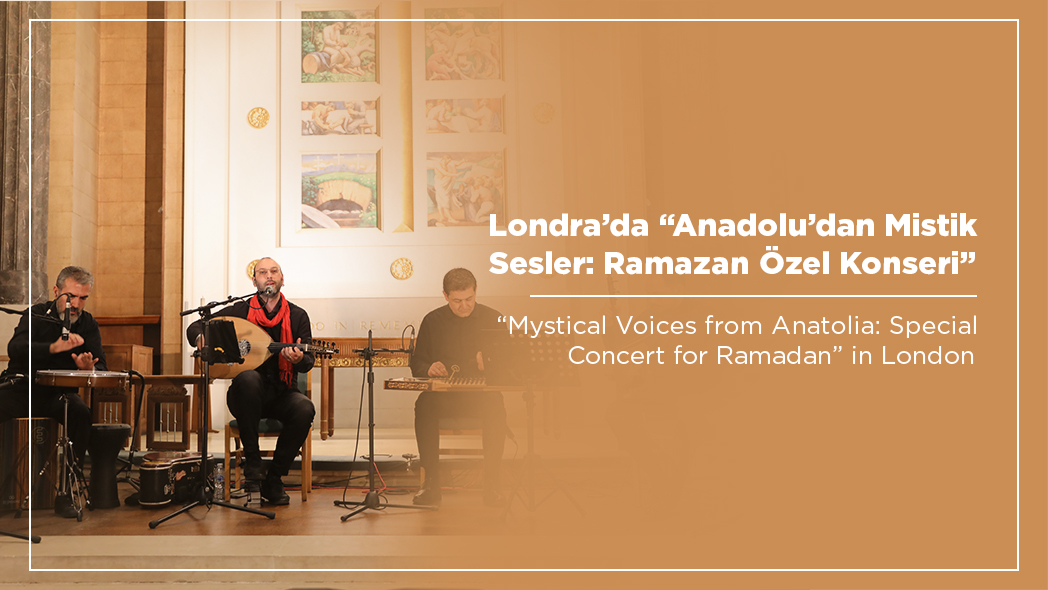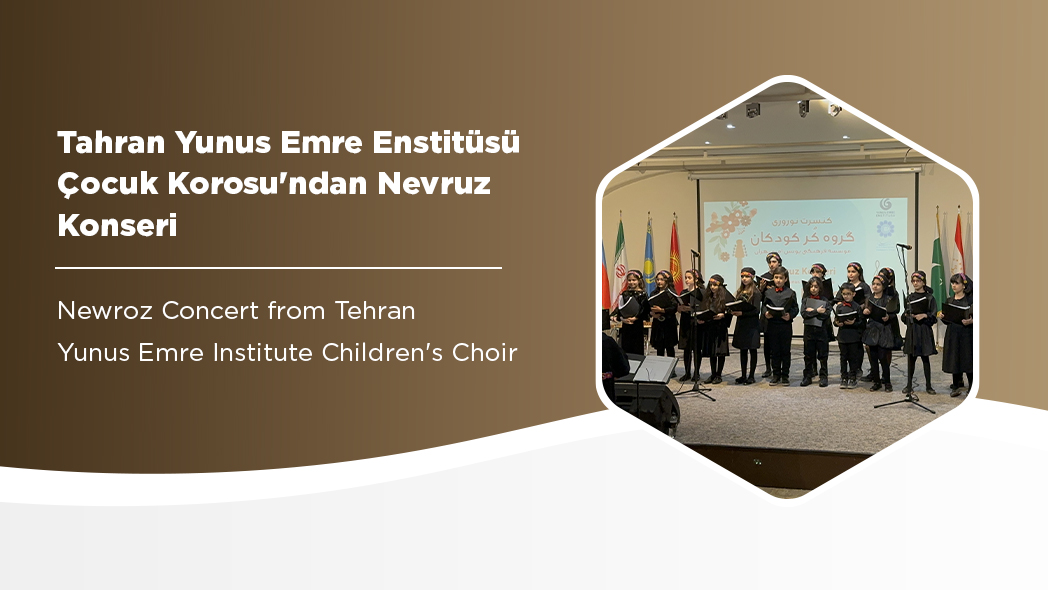"The Change of a Society Depends on Its Music"
Yunus Emre Institute hosted the world-renowned Ney Virtuoso Kudsi Ergüner. At the "Rethinking, Reinterpreting" programme hosted by Prof. Şeref Ateş, Ergüner talked about the relationship between music and culture and the changes in the relationship between different cultures and music throughout the time.
Yunus Emre Institute hosted he world-renowned Ney Virtuoso Kudsi Ergüner on February 24, 2021 as part of the "Rethinking, Reinterpreting" programme. At the programme hosted by Prof. Şeref Ateş, Kudsi Ergüner talked about the change in the perception of music in different cultures, the place of Eastern and Western music in universal art, and the characteristics of Sufi music.
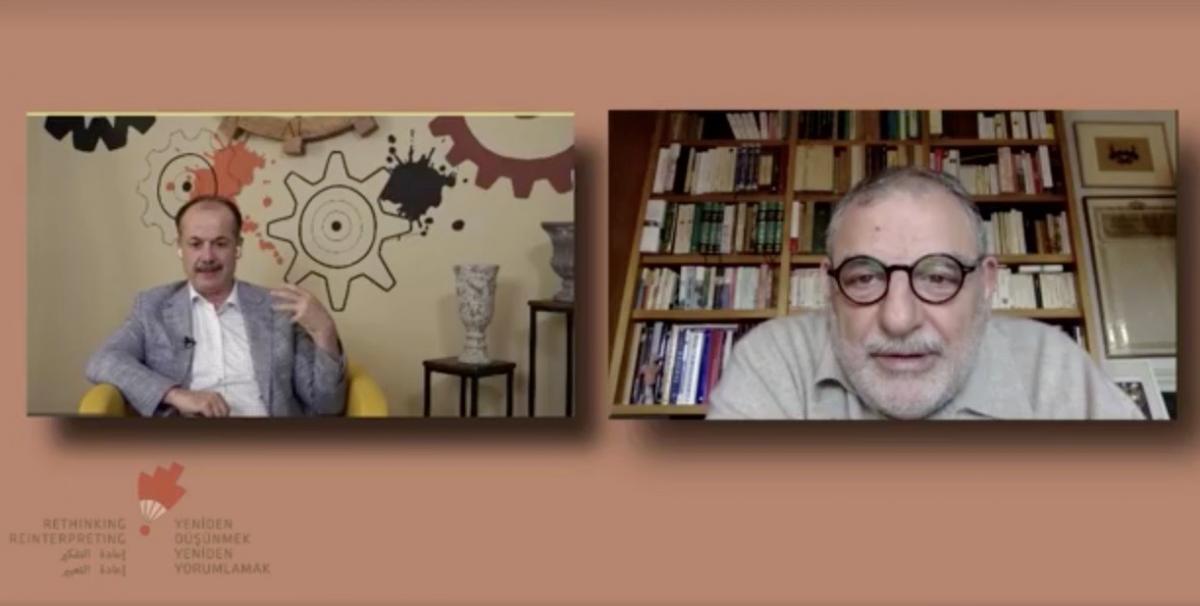
At the programme, Prof. Şeref Ateş first mentioned the founding mission of Yunus Emre Institute and said the following:
"When Yunus Emre Institute was established in 2009, its basic mission was based on creating a connection between the Turkish people and the people of the world. And the vision was set as establishing that connection through art and literature. However, the fact that UNESCO declared the year of Yunus Emre and the Presidency declared "Year of Turkish with Yunus Emre" in 2021, and the fact that Hacı Bektaş Veli and Ahi Evran, who are the other spiritual leaders of Anatolia, also became popular in 2021, shows us this: While we were talking about the intercultural soft power throughout history we realized that, according to the Yunus Emre school of thought, there is already a connection between the humans, nature and all objects... In a sense, as David (Peace Be Upon Him) says, "I shall call you with mountains and stones", or as Solomon (Peace Be Upon Him) talks with the birds... We have seen that the truth exists not only in between humans but also between all living things. Afterwards, as Yunus Emre Institute, we have increased our activities and started to think how we can strengthen this bond between all living things. In that sense, your works are quite in line with this school of thought."
"THE CULTURAL WORLD OF THE ANATOLIAN PEOPLE STRETCHES FROM INDIA TO EUROPE"
Kudsi Ergüner mentioned that the works of institutions on this issue were quite important and said the following:
"For years, we have tried to constrain our culture in our political geography of the past. Whereas, our people, in Anatolia, Istanbul or wherever in Turkey, have a cultural world spanning from India to the center of Europe including North Africa. We could not benefit from this for years, but we should do so. I have delivered a month-long seminar at the conservatory in Tunisia. The students of that conservatory tried to play all works of Tanburi Cemil Bey in order to acquire their diplomas." |
"There is a position artist gains individually with their arts. Of course, this must be evaluated accordingly. There can be a disconnection between the two. While there are world-renown artists, institutions must consider this. Not only the artists that can accomplish should be supported, but also the works that had been completed in the past should be brought up. As we do not bring up those that had been completed in the past or those that are being carried out, we try to re-do things. This is a loss of time. I would also like to highlight this: I would like to say it as a person who has been performing in concerts for about 50 years. For years, we have tried to constrain our culture in our political geography of the past. Whereas, our people, in Anatolia, Istanbul or wherever in Turkey, have a cultural world spanning from India to the center of Europe including North Africa. We could not benefit from this for years, but we should do so. I have delivered a month-long seminar at the conservatory in Tunisia. The students of that conservatory tried to play all works of Tanburi Cemil Bey in order to acquire their diplomas. That is why it is important. Or we have given a concert in Palestine. Half of the crowd in the hall knew at least half of that musical work. Of course, we are not aware of this. We are not aware of many institutions. Many institutions are not aware of this. The Ottoman Sultans, either Mehmed the Conqueror or the Suleiman the Magnificent sent help to Indonesia against the Portuguese. When I arrived at Bali, I saw that people there were playing Turkish music with shawm and drum. They call it the Turkish music. Meaning that, we have a culture extending even there. It was wrong not to utilize this until today. But we should appreciate the value of it now."
"POLITICS, ART AND CULTURE ARE QUITE CONNECTED TO EACH OTHER"
Prof. Ateş described the difference between culture and civilization and said the following:
The concept of civilization is especially emphasized in France. Germans studied the concept of culture after the 19th century. In fact, civilization encompasses all continuous positive values that complete and build upon each other. Culture is somewhat like customs: it is the manner of doing something. When viewed from this respect, we should not refrain from doing what is in our core. Yunus Emre Foundation and Institute could only be established in 2000s. Thus, it encompasses building upon each other.
Ergüner exemplified the difference between culture and civilization through the definitions of ethnicity and universal music, and said the following:
For instance, it says "Turkish ethnic music" for Itri's work. This is shameful. It is nonsensical just as writing "German ethnic music" on one of Bach's works. Even we started to see our own cultural heritage as something regional, ethnic, folkloric. This is perhaps a continuation of a complex within the process of Westernization. We should be able to see Rumi as same as Shakespeare. This is a matter of preference. That preference becomes a political preference. This is wrong. There is certainly a direct relationship between politics, culture and art. This is something that has been since the times of the Ancient Greeks. I mean the expression, "the change in a society depends on the change in their music". |
"The Western culture, especially during the age of enlightenment after the 18th century, has made the entire world accept the symphonic orchestra of the Western civilization as something prestigious. We have operas and symphony orchestras. The same effort is also present in African countries. However, do you think that the German villager can also enjoy listening to Mozart? We must think of a culture and art in two different manners. We must think of culture and art in two different manners. A people have a regional and ethnic cultural world. And then, there is the cultural world that can be universal. In principal, we see our own music as ethnic music through the influence of the West. I examine all the records created. For instance, it says "Turkish ethnic music" for Itri's work. This is shameful. It is nonsensical just as writing "German ethnic music" on one of Bach's works. Even we started to see our own cultural heritage as something regional, ethnic, folkloric. This is perhaps a continuation of a complex within the process of Westernization. We should be able to see Rumi as same as Shakespeare. This is a matter of preference. That preference becomes a political preference. This is wrong. There is certainly a direct relationship between politics, culture and art. This is something that has been since the times of the Ancient Greeks. I mean the expression, "the change in a society depends on the change in their music". On the other hand, we also have change in civilization. It is only natural that we have losses within that. We should start it with the republic. Then there is the time of Ahmed III, the Tulip Period, and the Royal Edict of Reform. After these, we have the Tanzimat Reform Era. In all these phases, some things were slowly left behind. I always give this as an example: Ismail Dede realizes during the reign of Abdulmecid that the people no longer appreciate this art. He thinks that their game is spoiled, takes two of his students, and goes to hajj. One of them dies there. He was buried at the foot of Ali. Of course, we do not know where his burial is as Wahhabis flattened the area. What I am trying to say is this. I imagine Ismail Dede leaves Istanbul somewhere around 1820-30. This is a turning point; this is when the Ottoman civilization lost to the Western civilization. Somethings continued after that. This is neither the continuation of the Turkish classical music nor a custom; there is a music that came down to today by adapting to the social issues. This of course shows that politics, art and culture are quite interconnected. It is not enough to just raise an artist. We should also raise the audience to enjoy that art. Some of our pleasures are the result of conditioning. Of course, you can rise in art, when there is a pleasure and love without such conditioning."
Prof. Şeref Ateş explained the connection between benevolence and aesthetics as follows: "It is important to carry out developments also in our geography. You may know this from the Islamic literature, but performing benevolent arts are seen as giving away money in the Islam of Benevolence.
Doing only good as benevolence. However, benevolence is aesthetic... Meaning that existence of humanity is at its final point ... to spread goodness and beauty. The tool that spreads the goodness and beauty is literature and art. The beautiful expression and description of the words, the frequency of the music are the semantic world. The Anatolian geography has had such a treasure for thousands of years. Meaning that, although a new century is a new era in terms of politics, the opinions of the people who have discovered the existence of such a human in this geography should be transformed into a new window for the world through you. Because another door opens. People say, "fortunately, they came, and fortunately, they have told us about this". That is to say, we see this in the activities we carry out as Yunus Emre Institute. We can see in Pakistan, in America what we cannot see in our own country. Because a new door opens."
Kudsi Ergüner answered the question of Şeref Ateş, "You must have noticed the value of your art, which has been seen as a second-grade art until the 70s, when you introduced it to the West. How do you personally see this?":
"This became popular after the 80s. However, before that, as you have said, when Mawlids or religious music were banned in the 30-40s, I personally remember that there was a single neyzen (ney player) in Istanbul... This is something incomprehensible: would people move away from civilization if they head Ismail Dede? These were political mistakes. Instead of taking revenge, we should start the repairs. Hopefully, Yunus Emre Institute will make those repairs."
Sufi poets such as Yunus Emre and Rumi and Sufi music were discussed in the enjoyable conversation between Prof. Şeref Ateş and Kudsi Ergüner.
Şeref Ateş: Hopefully, we will bring together the breath of Yunus, the breath of Anatolia to different geographies this year. Because, humanity really needs this different discourse. Because, the basic philosophy is important. In fact, art carries that basic philosophy in an aesthetic manner. Because of that, they have added more mystery in art around here. It is even called Sufi music. This could be the Sufi master or the music that the Sufi master listens to. Not like it was a tradition created by them. Ney also transmits the same mystery. There is always a designation of mystery. Both the Islamic geography and the Anatolian geography. What is the wisdom behind it?
Kudsi Ergüner: It could be called religious music when you listen to it by living the feeling of the moment at iftar in Ramadan. We should go beyond that. We should acquire some things as pleasures beyond the cultural resurgence. I have lived it as an artist. Everything you do can be a part of something big. "Let me call you through mountains and birds my god." As you know it is in a verse from the Quran, "Invoke Allah". Everybody who live spiritually get in a state of invocation at every sound they hear. This is the state of Rumi, state of Yunus. That is to say, it is the state of people who live their faith with pleasure. Music encourages such pleasure. In fact, it is called "tavacüd" in the Sufist tradition. In other words, invitation of ecstasy. Of course, as everything today is seen as subjects of consumption, we must perceive music as a value outside consumption. Poetry is the same. For instance, we generally know Yunus Emre as a folk poet, but Yunus Emre is a Sufist poet. The 90% of the chants that have been sang for centuries are Yunus Emre's poems. These are all poems that have leaked through Yunus Emre's council.
Ş.A.: And "science" for explaining the modern human, the god of the modern human. When you explain in a scientific language people understand. The fact that there are 18,000 universes in our culture that are in invocation, and the fact that the mystery between those universes can be understood through Sufism. Yunus Emre, Rumi, Ibn-i Arabi... We must know all these traditions so that we can open the door just a bit. Perhaps we should explain it through the modern discourse. There is Yunus and there is Rumi, who both tell about the unity in abundance. Thus, there is a Yunus who talks with a water drop or has a conversation with a flower. For that reason, the modern human needs the same thing. Perhaps through art and thought, we should express how living things complete each other beyond all those political discourses, religions and races.
K.E.: However, in order to accomplish these, there is the issue of transfer. There are many saints loved and praised by Yunus Emre and Rumi, and there is also Senai, who is very much loved by Rumi. They all have their works. Reading these develops a pleasure towards the transference of the humans, Quran and Hadiths. There is also the mental one. A person can acquire grace through the blessing of god and benevolence. However, these two are not separate from each other. Let us look at Sultan Abdulaziz from the Tanzimat Era. Sultan Abdulaziz has a musical work called invitation to dance. Sultan Abdulaziz is also a neyzen, he composed a sirto in hejaz tune. That is to say, many people from that period did not abandon their own worlds even though they were interested in the Western culture.
Ş.A.: They also have a distinguishable aesthetic pleasure.
K.E.: Yes, they improved both of them together. This exists in all arts. It is developed in architecture, music and literature. We have completely abandoned the Eastern wing of this world in the past because of the concern that it would prevent us from flying, having civilization. This is a big loss. We should close the gap. While closing the gap, we are trying to build unnecessary and unreal ideas. This is a mistake. One such bridge is to refrain from chauvinistic ideas. Something should not be beautiful because it is Turkish. Something should not be beautiful because it is made by Muslims. We should not seek them or us, we should seek what is right and beautiful. When we view it from this respect, flimsy bridges were built up through the nostalgia for the past. We should go beyond that. We believe that our classical music started after Selim III. The era of Selim III and later periods are also rich periods since there is also Ismail Efendi. However, there is a past to it. There is Abdülkadir Meragi. Think about it, Meragi lived in Herat. A wonderful musician who is brought to Semerkand by Timur when he was young and travelled to Herat later on. The ancestor of the Eastern music. The musical works and books of this person were even played and read in Istanbul. The entire Eastern world has completely forgotten about this. Think about it, there is also the grandson of Timur, Sultan Baykar, and his vizier Ali Şir Nevai. There is Shiekh al-Islam Molla Cami. The music played is the music of Meragi. Music composed by the Sultan also include the poem, "What Happened to You My Heart, What Happened to This Heart".
Ş.A.: Perhaps, they achieved universality in that period. When we look at today, we see a more chauvinistic a style, a style that puts forth ethnicity rather than art and aesthetics. This is sad.
K.E.: With the idea of Ziya Gökalp, we called it "the residue of the Byzantine music". Did Meragi also listen to Byzantine music in Herat? These are unproven theses. A few generations followed these. We should go beyond that. Look at Babur, the Sultan of the Mongols who founded a state in India. He has a special book called Baburnama. We talk about the Turkish language, but the Turkish language does not start and end with Yunus. There is a past to that. Today, wherever you go in the East, whether it be Khorasan or the Harezm State in India, there is a civilization that is part of our world.
THE ANATOLIAN PHILOSOPHY IS BASED ON COMPANIONSHIP NOT COMPETITION
Ş.E.: I believe that since capitalism has become the foremost system especially in the 20th century, they lived in order to utilize and benefit from the resources more. Humanity saw two world wars in this century. Therefore, you find a goodness to take with you when you look back at the past, to even India to Baburnama. If you want to take it, the doors always open. Therefore, it is also to send the good and beautiful to the modern human. I always say, the Anatolian philosophy is based on companionship not on competition. Thus, how we take the arms of each other, how can we make the road easier? How can we make the journey more beautiful? Therefore, if you do not have the materials to take with you, do not do it. Because of that, both what we receive from our history and today are important. We should reproduce the aesthetics and beauty today, and if they exist in other geographies, let us take them within us and work for humanity.

